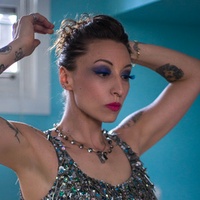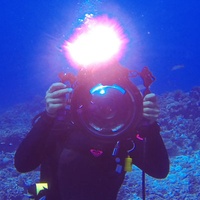As told to Zakiya Gibbons and Nick Yulman, 1350 words.
Tags: Music, Process, Education, Collaboration, Inspiration, Mental health.
On how to sound like yourself
Singer and voice teacher Daisy Press on helping other people find their voice, learning to appreciate the way things feel as opposed to the way they sound, and the joy that comes from pure expression.What is it that you do?
Most of my life revolves around making noise in one way or another. A lot of that time is helping other people make noise as well, in a natural, emotionally healthy, and sometimes joyful way. I’m a voice teacher.
What are the different roles that you wind up playing as a voice teacher?
There’s the technical knowledge you can provide to someone when they’re hoping to sing better. But inevitably it becomes about our feelings—our feelings about ourselves and what our voice has been our whole lives. For some of us, it’s the noises we haven’t made—the things we’ve taken in and we’re not able to say or feel anymore. Like, “Oh wow. You don’t feel permission to make this ugly sound.” It can be like therapy. It can be like shamanism (or my understanding of shamanism.) It can be anything the person who’s in front of me needs.
What do people usually need when they come to you?
Everyone comes with a desire for some freedom of expression. I have to teach people how to think about the sounds they are making. Vocal technique is largely invisible. When you take a guitar lesson it’s like, “Okay, curl your finger around like this. Make sure your fingers are close to the frets.” With a voice we can’t really do that. I can’t say, “Bring the back of your tongue so it’s touching the velum a little more?” You’d be like, “What’s going on?” So it’s trying to come up with technical and language cues to help people do things they don’t know by name or by anatomy.
Your specialty as a voice teacher is helping people sound like themselves. What does that mean to you?
The idea of sounding like yourself can be so deep and so wacky if you wanna go into the world of, “is there really a self at all?” But what I mean in terms of a voice lesson, is how do you express something in the moment without listening to yourself too much?
There’s a ring of authenticity when someone is expressing something versus when you can tell they’re listening to how it sounds and judging it. So how do I trick people into feeling comfortable enough being themselves to sound like who they are in that moment?
Getting people not to listen to themselves is almost counter intuitive. You might think that you’d have to listen to yourself to learn to sing.
Vocal technique for me and what I teach is based on sensation as opposed to listening and hearing. Because you’re going to be in a million different acoustic environments. It’s different in here than it would be in a cathedral than it would be on a subway. So how do we know when we’re singing well? It’s not how it sounds to us. It’s how it feels to us.
I say to students frequently, “It is simple but it’s not easy.”
When it comes to not listening to yourself, how much of that is about getting past an idealized version of what you should sound like—either your expectations for your own voice or wanting to sound like a famous singer?
Oh my gosh. Yeah. I have this one teenage student who just wanted to sound like Amy Winehouse. Her teacher before me didn’t like that. Like, “No more Amy Winehouse.” I was like, “Actually, no. Let’s make Amy Winehouse our teacher.” Let’s learn how to borrow from her. Then slowly become ourselves. But if she’s gonna get us singing and into this great space where we enjoy making art, then we borrow from that as much as possible.
Tori Amos was that person for me—singing with Tori Amos in the car as a teenager. But I was raised by singers too. My mom is a singer and she has hated her voice her whole life because she was Neil Diamond’s backup singer. Every single night she had to sing “You Don’t Bring Me Flowers,” Barbra Streisand’s famous duet with him. My mom sang that song for 40 years on the road. But she never quite felt right singing it because she was comparing herself to Barbara Streisand.
As a kid I wondered, “Why can’t she be happy with the voice that she has?” I don’t know if we’re attracted to doing things in our lives to heal the wounds of our parents. But, you know, I spend so many hours a week with people who want some sort of internal and vocal freedom—to just feel good about how they sound.
As a voice teacher, are there any meaningful moments you’ve had helping people find their voices?
I have some students who are not good at singing at all—by how we would normally measure that—but who love to sing. When I work with a student who cannot sing very well and they learn how to match a pitch—we’ve worked for months and they’re finally able to do it—that’s incredible to me.
With somebody like that, what motivates them? Have you talked to them about why they keep coming back?
A lot of people come to their voice lessons because it’s like therapy. I ask people, “Why are you doing this?” It’s usually about some sort of joy or expression—finding some sort of energy that’s lost. I find that so beautiful.
Every sound that we make is a thought made audible. When we’re babies we play. We play with high notes. We play with low notes. There’s no significance to the sounds that we make. We’re just being little creatures. We’re motivated by the need to stay alive. “Uhhhh” is how you tell someone I need this. “Owww” that hurts. We haven’t become sophisticated so we’re very free in how we express ourselves vocally.
Was there a moment when you found your own voice?
It happens all the time. I find it and then I lose it and find it again. I trained as a classical singer and specifically in experimental classical music and had a career singing this very intellectual, high-minded music for awhile. Then I got really sick of it. I was just sick of singing being so hard and music being so hard.
I was under the impression that, if I’m not singing perfectly, I just shouldn’t be singing at all. And then a few years ago I started singing the music of Hildegard of Bingen and singing these old medieval chants. As soon as I started singing those I was like, “Okay, this is it.” So finding my voice through this particular lady and through this particular kind of music was a really big moment.
My other influence is singing Indian music. Medieval music can be somewhat like Indian music—when I sing it at least. I really found my voice when I started practicing singing one note with a drone like Indian musicians do. Like, “I’m just gonna sing one note for a half hour.” That’s another way that I found joy and pleasure in singing again. Like, “Oh, I don’t have to sing these really difficult pieces. I can just sing this very simple thing.”
There’s a legend about my teacher’s teacher, Pandit Pran Nath. He apparently sat in a cave by a flowing river for several years and he sang the note of that river. So it was basically singing with a drone. Singing the same note for years and years. That actually sounds kind of like bliss to me.
Daisy Press recommends
Painting your own apartment wild colors, frequently. Specifically these colors: Benjamin Moore “Hot Lips” and “California Breeze”
Christmas lights all year long
Bullwhipping: the practice of learning how a bullwhip works is deep and cathartic and emotionally amazing. Here’s a great book by a bullwhip artist (many principles inside also apply to singing, OMG.)
Lords of the Left Hand Path: A History Of Spiritual Dissent by Stephen E. Flowers
My shruti box.




